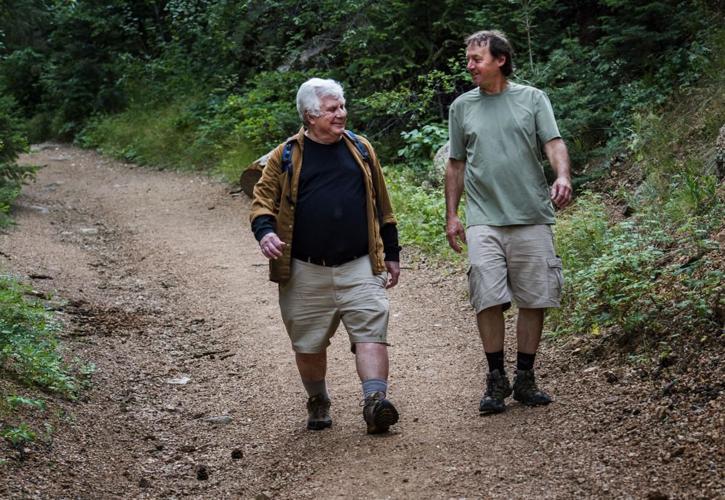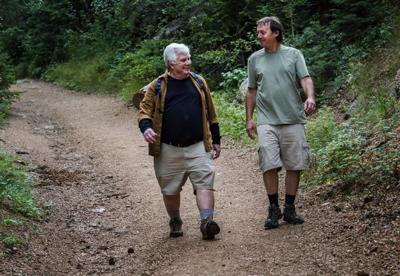A voice rises in the woods.
“Monteeee! Heeeyyy, Monteee! Heeeyyy, Monteee!” Allen Owen calls to his old mentor.
Monte Barrett, 70, is somewhere here along the former Barr Trail, following Ruxton Creek in Manitou Springs, Colorado and reacquainting himself with this place in his sweetest memories.
He and Owen, 55, had hiked here countless times in their youth. And while they still live in the area, they’re not exploring together anymore. Now Barrett has a backpack storing his oxygen supply.
He walks slowly, observing the vegetation he recalls. “There’s the ferns, the sumac,” his gravelly voice mutters. “The geraniums, there’s the chokecherries there. Lots of poison ivy. I don’t remember all this poison ivy.”
He and Owen stop at two rusted poles. A sign used to be attached, marking the mileage to Pikes Peak’s summit and its halfway point – their former stomping grounds. Now the sign is gone, lost with their own history.
They are the unheralded heroes of Barr Camp, essential to what is today the mountain’s famous way station.
Better known is the U.S. Forest Service’s plan to raze the few cabins on the grounds, which had been heavily vandalized under the Mennonite Church’s watch through the 1960s and mid-’70. An infrequent, summer-time presence on site was not enough to prevent the damage.
What followed was an “in-between, less-documented era,” say people who have studied the camp’s past.
It was a brief time in which Barrett oversaw the camp, setting today’s standard for year-round caretakers. Recent caretakers have provided a resting place for an estimated 2,500 overnighters a year, with tens of thousands more stopping by for a break and sustenance.
The tradition was set by unlikely companions – “a couple of long-time hikers,” as they are described on barrcamp.com‘s history page.
Other accounts credit Adventures Ltd. for saving the camp from the Forest Service’s threat. That was the operation Barrett started working under in 1978. He was 31, strapping and big-haired in a picture that ran with a Gazette article that year. In it, he is leaning against the cabin that Fred Barr built in the 1920s, with the attached bunkhouse where Barrett would charge overnighters $2 for a spot.
Owen would prove to be his most dedicated caretaker for a year, staying at the cabin through the winter while making “super stew” to serve guests – the first regular meal before today’s spaghetti.
Barrett had seen the place wrecked in his many adventures to those woods 10,200 feet high. He recalls busted windows, missing doors, packrats and crater-like spots in the wood floor where campers evidently built fires. And garbage. Garbage everywhere.
“He was the guy who saved Barr Camp from ruin,” reads an email from Robert Houdek, cartographer and current keeper of the Pikes Peak Atlas, locals’ go-to guide of the region’s wilderness for 50-plus years.

Allen Owen, right, sits beside a friend at Barr Camp in 1980. That year, through the winter, Owen served as a caretaker at the camp, setting the standard for caretakers as he made “super stew” for guests. Photo Courtesy of Allen Owen.
“He deserves the Fred Barr Meritorious Service Medal for the Twentieth Century.”
(See the atlas noting a landmark near Barr Camp named “Monte’s View Rockpile.”)
First Barrett got the deed from the Mennonites – “$1 under good consideration,” he says. Then he visited the Forest Service’s district ranger for the lease. He told Barrett of the demolition plans.
“I was like, ‘No man! Barr Camp has a purpose! It has to be there!'”
Searching for ‘freedom’
Sometimes Barrett’s trips to the camp were in the middle of the night; sometimes psychedelics were involved. And often he was followed by Don McClung, who, being new to Manitou Springs in the early ’70s, found a perfect friend in Barrett.
McClung came from Indiana, wanting to “reinvent” himself in the West. He is today well-known as a mountain bike-builder extraordinaire in Salida. And Barrett was establishing himself as a true Pikes Peak mountaineer, bushwhacking his way to a ring that included the likes of the late, great Robert Ormes.
Barrett asked McClung to join him in his Barr Camp mission, which lasted about four years.
“Our job was basically to rescue it,” says McClung, 74. “We had a short but vital function there. And a lot of people know Barr Camp now, and it’s hard for me to believe it’s as popular as it is. Back then, there weren’t many people wanting to stay there or anything.”
Owen did. When he met Barrett, he was 17, a self-described rabble-rouser who wasn’t much for home life. He preferred “the hippie house” on the Westside that welcomed him. Nor was he much for school. “I loved learning, loved reading,” he says. “But I didn’t like sitting under fluorescent lights all day.”
These were the days of Jack Kerouac, Ken Kesey, the Merry Pranksters, he says, days when he was realizing the precious notion of freedom as he paid attention to politics and widespread development across Colorado Springs, where he’d grown up since 1962 – “the year of the Cuban missile crisis!” he notes. Owen didn’t want “normal life.”
“I wanted that cabin in the woods,” he says. “I wanted that Jack London, that freedom.”
He wanted to be Barrett, whose approach to the mountain Owen envied. The man would take a different drainage every time, always discovering something new.
“I’ve always done that kind of thing,” he OWEN? says, remembering wandering alone as a 7-year-old through the woods in Oklahoma, where he grew up bored, went to college for a while and protested Vietnam before loading his Volkswagen bound for Colorado.
One day in 1980, Owen followed Barrett on Barr Trail, veering off with him to a wild area known as “Three Ponds.”
“I’m this little puppy, and he just leaves me there,” Owen says.
Barrett was impressed by the kid’s self-reliance. And he was impressed the time he took Owen free-rappelling in a cave the first time. “He had some cojones,” Barrett says.
Which is why he asked Owen to be caretaker.
Work and play
To be sure, there was partying at Barr Camp those days – beer, weed, girls. But mostly there was work.
Disposing the loads of garbage Barrett found was a months-long task. He reinstalled the cabin’s windows and doors. He and McClung recall most every week hauling up packs that never seemed short of 80 pounds, filled with whatever provisions the two could afford for Owen. Barrett picked up jobs where he could – driving tours up the peak, manning a hotel desk, construction – while McClung worked as a mechanic.
Owen, meanwhile, spent afternoons chopping timber with an ax; they had no money for a chainsaw. He would pick yarrow, anise and strawberry and raspberry leaves and let it steep in water under the sun. In the evening, he baked bread in the little oven he placed over the woodstove and scrounged up food for the “super stew.” At 6 p.m. he was radioing in to the Sheriff’s Office to report he was safe. And before putting out the kerosene lamp for bed, he was checking on guests, “being a caretaker,” he says.
He and Barrett also performed the important duty that remains of caretakers today: guardians of the mountain. They took in the sick and went out to find the lost, no matter the cold or time of night, as directed by search and rescue.
“Remember the guy running through the woods?” Owen asks Barrett. They begin to laugh, and Owen waves his arms around. “Aaaaahhhh!”
“Yeah,” Barrett replies with a smile, “we’re sitting up just above timberline, on a big rock, just looking at the view. We’re up there, just looking around and – well, actually, we were smoking a joint – but then we see a guy running through the woods, screaming and hollering: ‘Help! Help me! Help!’
“So we hop off the rocks, we intercept him down there. He says, ‘I’m lost! I’m lost!’ Anyway, we got him calmed down, back on the trail.”
The memory spurs another for Barrett. “Oh, one time I got a call from the sheriff’s department that a woman and her daughter were missing … ”
The story ends happily. As does the story about bigfoot encounters. “Well, we don’t know what we saw,” Owen says of the large shadow that crept by the cabin’s window, making him clutch the .357 revolver beneath his mattress.
They tell other fantastic tales, about arm-length crystals hiding in fissures, about tiny mushrooms glowing faintly green in the dark. “The mountain is magical,” Owen insists fondly, three decades after he left Barr Camp.
Barrett encouraged him to come down and live a “normal life.” Owen today works under a real estate group. Barrett felt he too needed to pull away from the mountain.
“It took every penny we had and all of our time,” McClung says. Says Barrett: “My wife was about ready to leave me.”
He handed the operation over to “a young guy with more energy than brains,” he jokes. The camp’s caretaking history becomes more clear starting with that guy, Bob Will, who served into the early 1980s. Over the years, more improvements sprouted, with the solar power and composting commode there now coming after the camp’s nonprofit was formed in the late ’90s. Caretakers have come and gone.
And while Barrett settled into a construction career, he felt liberated without the camp’s responsibilities. “I could just enjoy wandering around the woods again,” he says. He could be that kid again.
‘A good reminder’
Now Barrett pats his belly. “I didn’t used to have that,” he says. He unbuttons his shirt to reveal the scar across his wrinkly chest, the result of an open-heart surgery. Doctors have ordered him not to hike, and he hasn’t been to Barr Camp in 15 years.
Owen regrets that. He wants his mentor alongside him as he continues to explore Pike Peak’s off-trail quadrants, seeking its magic.
“What’s happened to Monte is why I wanted this story to get out,” Owen says. “It’s a good reminder that you never know when your last adventure with somebody’s gonna be.”
As for Barrett, he has no regrets.
“I’ve talked to a lot of old people who invariably say if they had to do it again, they would’ve had more fun. I’m glad I did. I’ve had more than my share of fun.”










(0) comments
Welcome to the discussion.
Log In
Keep it Clean. Please avoid obscene, vulgar, lewd, racist or sexually-oriented language.
PLEASE TURN OFF YOUR CAPS LOCK.
Don't Threaten. Threats of harming another person will not be tolerated.
Be Truthful. Don't knowingly lie about anyone or anything.
Be Nice. No racism, sexism or any sort of -ism that is degrading to another person.
Be Proactive. Use the 'Report' link on each comment to let us know of abusive posts.
Share with Us. We'd love to hear eyewitness accounts, the history behind an article.